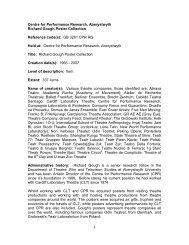Aberystwyth University and Amgueddfa Cymru – National Museum ...
Aberystwyth University and Amgueddfa Cymru – National Museum ...
Aberystwyth University and Amgueddfa Cymru – National Museum ...
Create successful ePaper yourself
Turn your PDF publications into a flip-book with our unique Google optimized e-Paper software.
<strong>Aberystwyth</strong> <strong>University</strong> <strong>and</strong> <strong>Amgueddfa</strong> <strong>Cymru</strong> <strong>–</strong> <strong>National</strong> <strong>Museum</strong><br />
Wales<br />
AHRC Collaborative Doctoral Award Studentship<br />
FURTHER PARTICULARS<br />
“Do Networks Have Margins? Locating the Avant-‐garde of the 1960s: The<br />
performance works of Ivor Davies at <strong>Amgueddfa</strong> <strong>Cymru</strong>-‐<strong>National</strong> <strong>Museum</strong> Wales”<br />
<strong>Aberystwyth</strong> <strong>University</strong> <strong>and</strong> the <strong>National</strong> <strong>Museum</strong> of Art at <strong>Amgueddfa</strong> <strong>Cymru</strong> -‐<br />
<strong>National</strong> <strong>Museum</strong> Wales (AC-‐NMW), are pleased to invite applications for a three-‐<br />
year doctoral studentship, fully funded by the AHRC (full fees; annual stipend of<br />
£14,400; plus associated expenses of up to £1,000 per annum), to commence on 1<br />
October 2013.<br />
The research will be supervised by Professor Heike Roms (Theatre, Film <strong>and</strong><br />
Television Studies, <strong>Aberystwyth</strong> <strong>University</strong>) <strong>and</strong> Dr Jacqueline Yallop (English <strong>and</strong><br />
Creative Writing, <strong>Aberystwyth</strong> <strong>University</strong>) <strong>and</strong> Nicholas Thornton (Head of Modern &<br />
Contemporary Art, AC-‐NMW).<br />
CLOSING DATE for applications: 5 July 2013<br />
INTERVIEWS to be held: 19 July 2013<br />
STARTING DATE: 1 October 2013 (a later start date of 1 January 2014 will also be<br />
considered)<br />
THE RESEARCH PROJECT<br />
Keywords: destruction in art; performance art curatorship; re-‐enactment<br />
Painter, writer <strong>and</strong> activist Ivor Davies (b. 1935) is one of the foremost figures in<br />
contemporary Welsh art. Always interested in the most radical art movements,<br />
during the 1960s Davies was involved in so-‐called Destruction in Art, creating a series<br />
of performances involving explosives, which he showed in Durham, Bristol, Swansea<br />
<strong>and</strong> Edinburgh, <strong>and</strong> at the seminal Destruction in Art Symposium (DIAS) in London in<br />
1966. In 2016, in celebration of the 50 th anniversary of DIAS <strong>and</strong> Davies’ 80 th<br />
birthday, <strong>Amgueddfa</strong> <strong>Cymru</strong> <strong>–</strong> <strong>National</strong> <strong>Museum</strong> Wales will stage a major<br />
retrospective of Davies’ work in Cardiff. The exhibition will centre on Davies’<br />
performance output of the 1960s in the context of Destruction in Art <strong>and</strong> place<br />
Davies’ work alongside that of fellow DIAS contributors such as Yoko Ono, Gustav<br />
Metzger or John Latham, featuring selected archival material alongside original<br />
artworks.
This associated research project, undertaken as a collaboration between <strong>Amgueddfa</strong><br />
<strong>Cymru</strong> <strong>–</strong> <strong>National</strong> <strong>Museum</strong> Wales <strong>and</strong> <strong>Aberystwyth</strong> <strong>University</strong>, will use the occasion<br />
of the exhibition to explore the relationship between internationalism <strong>and</strong> localism<br />
in the avant-‐garde of the 1960s. The post-‐war avant-‐garde has been characterized as<br />
a scene of truly international character: the experience of the Second World War, a<br />
growing awareness of the global reach of issues such as nuclear threat <strong>and</strong><br />
environmental devastation, <strong>and</strong> enhanced transnational communication <strong>and</strong> travel<br />
motivated artists engaged in the ‘countercultural’ practices of the late 1950s <strong>and</strong><br />
1960s to build international networks of exchange, solidarity <strong>and</strong> collaboration.<br />
Whilst new approaches to making may have originated in particular places (New<br />
York, Tokyo, London or Paris, say), they quickly circulated across national boundaries<br />
with the help of specialist publications or through artists encountering each other’s<br />
work in the context of exhibitions <strong>and</strong> festivals. But how exactly did such<br />
transnational exchange take place? How did it influence the work of artists engaged<br />
in this exchange? And how widely did such influence extend beyond the world’s art<br />
metropolises?<br />
The focus of the research will be on the period’s performance-‐based approaches to<br />
artistic experimentation such as "Happenings" <strong>and</strong> early performance art. However<br />
international its influences, performance always possesses a local dimension as it is<br />
generally realized in response to the circumstances of a specific context, making it an<br />
ideal case study for the negotiation (<strong>and</strong> sometimes tension) between international<br />
artistic influences <strong>and</strong> local conditions of making. The project will thus offer a<br />
historical perspective on contemporary debates around issues such as globalisation,<br />
transnationalism, localism <strong>and</strong> networking in art. It will approach these themes<br />
through the lens of Ivor Davies’ performances in the context of Destruction in Art.<br />
The work of Davies, who as an artist has been committed to both international<br />
exchange <strong>and</strong> Welsh culture <strong>and</strong> politics, sheds light on how artistic practices of the<br />
1960s were shaped by transnational aesthetic, social <strong>and</strong> political influences on the<br />
one h<strong>and</strong> <strong>and</strong> local cultural <strong>and</strong> artistic concerns <strong>and</strong> conditions of making on the<br />
other.<br />
The project will provide a doctoral student with unprecedented access to Davies’<br />
private collection, which includes the most comprehensive set of papers related to<br />
the Destruction in Art Symposium in existence <strong>and</strong> as such a resource of major<br />
international significance. It will also provide access to Davies himself <strong>and</strong> his<br />
extensive memories of the period. Its close association with a major exhibition will<br />
provide the student with a platform on which to combine their historical, archival<br />
research on performance with a practical exploration into how to such research may<br />
be visualized <strong>and</strong> embodied (through exhibition display, re-‐enactments, etc) so that<br />
it creates a rich opportunity for the public to learn about <strong>and</strong> engage with a major<br />
aspect of Welsh <strong>and</strong> international art.
Research Questions. The central questions this research seeks to pose are as<br />
follows:<br />
-‐ How did the international avant-‐garde art movements of the post-‐war period <strong>–</strong><br />
especially Happenings <strong>and</strong> performance art <strong>–</strong> develop through practices of<br />
networking?<br />
-‐ To what extent were the artistic practices of the 1960s shaped by transnational<br />
aesthetic influences <strong>and</strong> by local political, cultural <strong>and</strong> artistic concerns <strong>and</strong><br />
conditions?<br />
Within the frame of these overarching questions, it is expected that the research<br />
student will be seeking to answer questions such as the following:<br />
-‐ How did Welsh artists contribute to the international neo-‐avant-‐garde <strong>and</strong> vice<br />
versa?<br />
-‐ How does tracking a specific artistic network (eg. DiA) allow new insights into<br />
notions of ‘stylistic development’ <strong>and</strong> ‘movements’ in relation to performance<br />
art? And how may such network connections be displayed in an exhibition?<br />
-‐ Can performance strategies of re-‐enactment <strong>and</strong> process-‐based exhibition design<br />
constitute a performative mode of historiography in relation to performance<br />
history?<br />
-‐ What are the forms of public engagement that such strategies enable with regard<br />
to art historical materials, especially with the archival remains of performance<br />
events?<br />
Methods. The student will be grounded in <strong>and</strong> encouraged to select (in consultation<br />
with supervisors) from the most appropriate methods for the project, which are<br />
likely to include: archival research (extensive research into Ivor Davies’s personal<br />
collection, complemented by research in the archives of AC-‐NMW, Arts Council of<br />
Wales, <strong>National</strong> Library Wales, <strong>National</strong> Screen & Sound Archive Wales, <strong>and</strong> Tate<br />
Archive); oral history interviews; <strong>and</strong> performance-‐based display (distinctive<br />
curatorial approaches to the display of performance art materials).<br />
Outcomes: Depending on the interests of the students, the final submission can take<br />
either the form of a written dissertation (80,000 <strong>–</strong> 100,000 words); or be a practice-‐<br />
led submission, comprising written dissertation (40,000-‐50,000 words) <strong>and</strong> as a<br />
practice component a distinct contribution to the Ivor Davies: Destruction in Art<br />
exhibition <strong>and</strong> accompanying outreach programme (to be identified with<br />
supervisors).<br />
WHAT WE ARE OFFERING<br />
1. The award pays tuition fees at the Home/EU rate <strong>and</strong> a maintenance grant each<br />
year (£14,400) plus associated expenses (up to £1,000 per annum), for a maximum<br />
of three years of full-‐time doctoral study, subject to evidence of satisfactory<br />
progress.<br />
2. The student will benefit from the lively research culture at the Department of<br />
Theatre, Film <strong>and</strong> Television Studies, one of the largest departments of its kind in the<br />
UK, which currently has some 40 PhD research students working on a wide range of<br />
projects. The student will receive full research training at <strong>Aberystwyth</strong> <strong>University</strong><br />
during the first semester of the studentship. Additional Oral History training will also
e provided.<br />
Further details about postgraduate research in the Department of Theatre, Film <strong>and</strong><br />
Television Studies are available on the following website:<br />
http://www.aber.ac.uk/en/tfts/prospective-‐students/prosp-‐pg/<br />
3. The student will be provided with access to office space.<br />
4. The student will be given unprecedented access to Davies’s personal collection,<br />
which includes the most comprehensive set of papers related to the Destruction in<br />
Art Symposium in existence. The project will also provide access to Davies himself<br />
<strong>and</strong> his extensive memories of the period. Furthermore, the student will benefit<br />
from the unique opportunity afforded by the partnership with AC-‐NMW <strong>and</strong> its staff,<br />
resources <strong>and</strong> in-‐house training to gain general experience of a working museum<br />
environment, curatorial expertise, conservation <strong>and</strong> archival expertise, <strong>and</strong> expertise<br />
in outreach work.<br />
5. The student will be based initially in <strong>Aberystwyth</strong>, with extended periods of<br />
fieldwork to be undertaken in Cardiff during the second <strong>and</strong> third year of the PhD.<br />
Supervision<br />
The research will be supervised by Professor Heike Roms (Theatre, Film <strong>and</strong><br />
Television Studies, <strong>Aberystwyth</strong> <strong>University</strong>) <strong>and</strong> Dr Jacqueline Yallop (English <strong>and</strong><br />
Creative Writing, <strong>Aberystwyth</strong> <strong>University</strong>) <strong>and</strong> Nicholas Thornton (Head of Modern &<br />
Contemporary Art, AC-‐NMW).<br />
For more information on Professor Roms: http://www.aber.ac.uk/en/tfts/staff/hhp/<br />
For more information on Dr Yallop: http://www.aber.ac.uk/en/english/staff/jay4/<br />
Individual <strong>and</strong> joint supervisions will take place at dates to be agreed with the<br />
student on at least a monthly basis. An annual progress review will take place at<br />
<strong>Aberystwyth</strong> <strong>University</strong>.<br />
START DATE<br />
The preferred start date is 1 October 2013, although a later start date of 1 January<br />
2014 can also be considered in exceptional cases.<br />
WHAT WE ARE LOOKING FOR<br />
The successful c<strong>and</strong>idate will choose the specific topic of their own doctoral research<br />
within the project's general remit. We are looking for a highly promising student<br />
who will value the opportunity of combining academic research in this area with<br />
involvement with a leading cultural sector organisation.<br />
The person appointed will meet the following criteria:<br />
1. S/he will have an appropriate good undergraduate degree, <strong>and</strong> a successfully<br />
completed or to be completed MA, ideally in an area of performance studies, art<br />
history, theatre history, cultural studies or curatorial studies.<br />
2. S/he will show the potential to develop a range of advanced research skills,<br />
particularly in the area of curatorial practice, archival research <strong>and</strong> oral history<br />
research.<br />
3. S/he will have an enthusiasm for the subject area <strong>and</strong>, ideally, some knowledge of<br />
recent British performance or art history <strong>and</strong> performance theory.<br />
4. S/he will demonstrate the ability to work effectively in academic <strong>and</strong> non-‐
academic environment <strong>and</strong> a willingness to work on the project in a manner that is<br />
consonant with its requirements.<br />
C<strong>and</strong>idates must meet the AHRC's academic criteria <strong>and</strong> because of funding<br />
regulations, must be either a UK national, or a non-‐UK national who satisfies AHRC<br />
eligibility criteria. Applicants are advised to consult ‘Student Funding Guide 2012-‐13’<br />
on the AHRC website<br />
http://www.ahrc.ac.uk/SiteCollectionDocuments/Student-‐Funding-‐Guide.pdf<br />
or to contact the AHRC directly to establish whether or not they meet these<br />
requirements.<br />
HOW TO APPLY<br />
1. You can apply online or offline using <strong>Aberystwyth</strong>’s st<strong>and</strong>ard PhD application<br />
FORM<br />
http://www.aber.ac.uk/en/postgrad/howtoapply/<br />
2. You must include two academic REFERENCES <strong>and</strong> academic transcripts. Please<br />
inform your referees about the distinct nature of the CDA project so that they may<br />
take this into account when writing letters of reference.<br />
3. Please include a STATEMENT (max 500 words) outlining:<br />
* how your previous experience will equip you to undertake the proposed research<br />
* how you envisage the collaborative nature of the project being of benefit to your<br />
research<br />
* how you consider the research will further your future career plans.<br />
4. Please also include a research PROPOSAL (max 1000 words) outlining:<br />
* how you will refine the project as laid out in the project description in order to<br />
achieve your own research aims<br />
Closing Date for formal applications: Friday 5 July 2013. Interviews will take place<br />
on the 19 July 2013 at <strong>National</strong> <strong>Museum</strong> Wales, Cardiff.<br />
Interviewees will be asked to make a 10-‐minute presentation based on their<br />
proposed topic or initial ideas for this PhD research project.<br />
For informal enquiries <strong>and</strong> further information please contact Professor Heike Roms,<br />
Department of Theatre, Film <strong>and</strong> Television Studies, <strong>Aberystwyth</strong> <strong>University</strong>, SY23<br />
3AJ (hhp@aber.ac.uk).


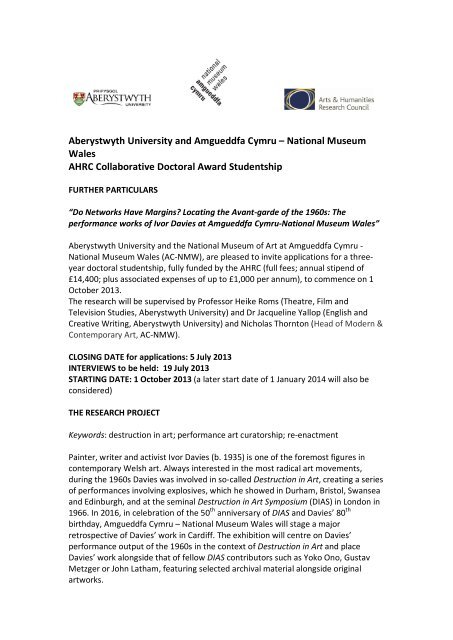
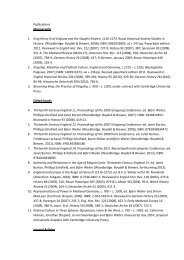
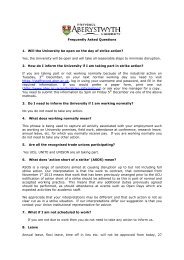

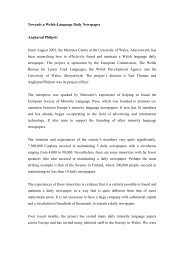
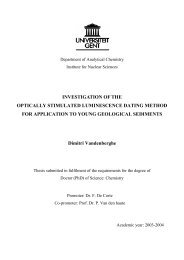
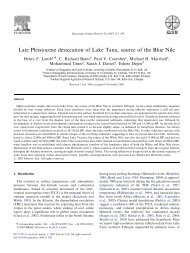
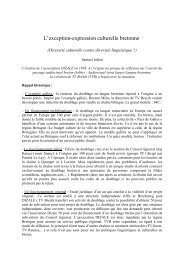
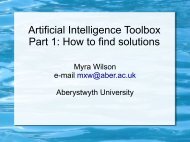
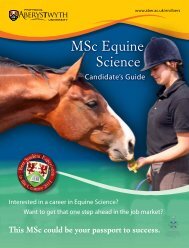

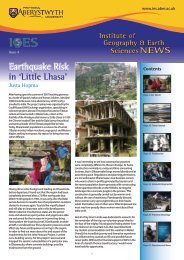
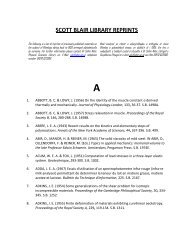
![[pdf] the council - Aberystwyth University](https://img.yumpu.com/8200062/1/184x260/pdf-the-council-aberystwyth-university.jpg?quality=85)
